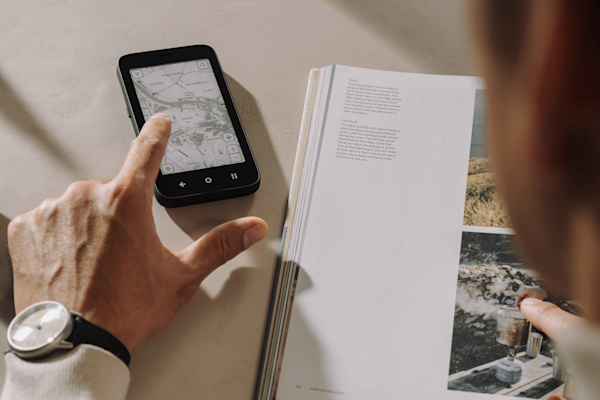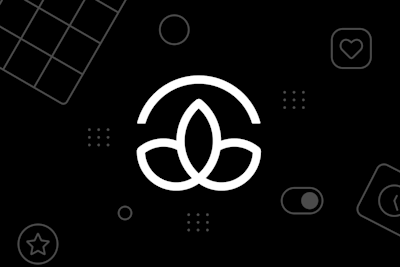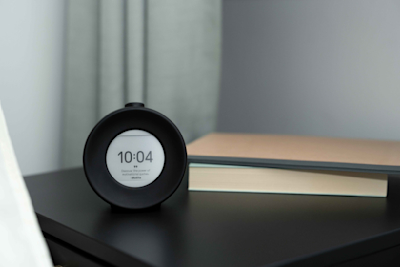
Mindful tech use & the key to a healthier, happier brain
Mindful Tech Use Means Staying Present in a Digital World
Imagine sitting down with a book, only to feel the pull of your phone within minutes. You check a quick notification, but suddenly, you’re 30 minutes into an endless scroll, absorbing bite-sized content that vanishes from memory almost as fast as you consume it.
Later, when you try to focus on work, your thoughts feel scattered, your mind sluggish. Does that sound familiar? Well, you’re not alone.
We live in a world designed to keep us engaged. After all, they don’t call it ‘The Attention Economy’ for nothing. Endless notifications, infinite scrolling, and algorithm-driven content are all vying for our attention. However, what’s the real cost of this constant digital stimulation? Research shows that overexposure to fast-paced digital input doesn’t just distract, it actually changes how our brains function, shortening attention spans, increasing stress, and making it harder to find joy in everyday life. [1][2]
The upside? Just as technology can overwhelm us, it can also be used intentionally to support mental clarity and well-being.
Here’s how digital overstimulation affects your brain, and, more importantly, what you can do to break the cycle.
How Digital Overstimulation Affects the Brain
Your Brain Craves Constant Hits of Dopamine
Every like, comment, and push notification triggers a small surge of dopamine. That’s the same neurotransmitter involved in reward and addiction. Apps are designed to keep you coming back, creating a cycle of checking, scrolling, and seeking the next tiny rush of validation or novelty.
Example: Ever caught yourself reaching for your phone at a red light? Or opening an app moments after you just checked it? That’s your brain rewired for constant stimulation, making moments of stillness feel uncomfortable
Your Attention Span is Shrinking
If focusing on a book or an in-depth conversation feels harder than it used to, it’s not your imagination. The more we train our brains to hop between notifications, messages, and apps, the harder it becomes to sustain deep focus.
Example: You start writing an email, but a Slack message pops up. You answer it, then check social media, glance at a news article, and….wait, what were you writing again? Repeat this cycle dozens of times a day, and deep work becomes nearly impossible.
Chronic Stress and Anxiety Are on the Rise
Our brains were never meant to process an endless stream of news, opinions, and notifications. Each time we get a negative update, our stress hormone, cortisol, spikes. The result? A heightened state of hypervigilance, where the nervous system is always on edge, making it harder to truly relax.
Example: You start your day with a quick scroll through the news and social media. Within minutes, you're hit with bad news, an argument in the comments, and someone’s perfectly curated vacation photos (while you’re stuck with a work project, chasing a deadline). Before you’ve even had your morning coffee, your brain is already stressed, overstimulated, and feeling behind.
Memory is Taking a Hit
When information is always available at our fingertips, our brains start relying on external sources instead of committing things to memory. This digital offloading weakens our ability to recall information, problem-solve, and retain details long-term.
Example: How many phone numbers do you remember off the top of your head? Let me guess, maybe just one or two. That’s probably because we no longer need to memorize them. The same thing happens when we skim content instead of deeply processing it. The fact is, we consume more, but retain less.
Emotional Regulation is Weakening
The speed and intensity of online content train our brains to seek high-stimulation experiences, making real-world moments feel less rewarding. Slower, more subtle joys, like a quiet walk or a deep conversation, may start to feel “boring” compared to the digital world’s instant highs.
Example: If TikTok feels fun, but sitting still with your own thoughts feels unbearable, that’s a sign your brain has been rewired for constant engagement.
Sleep is Getting Wrecked
Blue light exposure suppresses melatonin, making it harder to fall and stay asleep. But it’s not just the light, the cognitive stimulation of endless content, late-night emails, and doomscrolling keeps the brain too alert to power down properly.
Example: You promise yourself one last video before bed. Thirty minutes later, you’re still scrolling, eyes burning, but your brain refuses to shut off. The next morning, you wake up groggy, hit snooze multiple times, and wonder why you feel so exhausted.
Social Skills Are Taking a Backseat
Excessive screen time, especially on social media, can replace face-to-face interactions, making real-life conversations feel more awkward or draining. Human connection thrives on nonverbal cues, deep listening, and patience, all the things digital interactions often lack.
Example: You text a friend instead of calling because it feels easier. When you do meet up in person, silences feel uncomfortable, and your hand itches to check your phone instead of sitting with the moment.
How to Counteract Digital Overstimulation
At Mudita, we believe the solution isn’t to reject technology outright, but rather to use it mindfully & intentionally. We know we cannot turn back time. Technology is here to stay. However, we don’t have to let it TAKE OVER our lives.
By making small, intentional changes, you can reset your brain, improve focus, and cultivate a healthier relationship with tech. This is where digital minimalism comes into the picture.
Digital Minimalism Is A Philosophy for Regaining Control
Don’t get us wrong, digital minimalism isn’t just about using less tech just for the sake of it. It’s more about rebuilding your relationship with technology from the ground up, using your deepest values (not convenience or trends) as the foundation.
As Cal Newport defines it, digital minimalism is:
"A philosophy of technology use in which you focus your online time on a small number of carefully selected and optimized activities that strongly support things you value, and then happily miss out on everything else."
Try not to think of it as a list of productivity hacks, but more like a deliberate, value-driven approach that challenges you to ask:
What do I actually want from life?
Which technologies support those goals—and which simply distract?
Am I using these tools, or are they using me?
Instead of constantly reacting to what your phone throws at you, digital minimalism puts you back in charge. You decide which digital tools deserve your time and attention. You choose intentional use over default behaviors.
It also invites you to reclaim what technology has crowded out:
Uninterrupted time. Solitude. Deep work. Real connection. Joy in the analog.
When you adopt digital minimalism as a philosophy, your goal shifts from constant connectivity to selective, intentional engagement. You stop chasing every notification and start seeking depth, meaning, and peace.
“The key to thriving in a high-tech world is to spend much less time using technology.” – Cal Newport
So, in practice (and in reality) it’s not about becoming anti-tech. It’s about aligning your tech use with what really matters (this part makes a difference) and confidently ignoring everything else.
So, how does this translate into real-life actions?
Create Intentional Tech-Free Moments. Start with simple shifts, like keeping your phone out of the bedroom or designating screen-free mornings. Using a minimalist alarm clock like Mudita Harmony ensures you wake up without an immediate flood of notifications.
Mudita Harmony 2 in Charcoal Black and Pebble Grey
Prioritize Deep Work and Single-Tasking. Instead of bouncing between apps, dedicate uninterrupted time to focused tasks. The FOCUS Timer on Mudita Harmony is a great way to structure deep work sessions, helping you stay in the moment without digital distractions.
Unplug to Improve Sleep. Replace nighttime scrolling with a wind-down ritual, like reading or meditation. The soft, E Ink display on Mudita Harmony provides a low-light, distraction-free alternative to screens before bed.
Engage in Low-Stimulation Activities. To reset your brain’s reward system, spend time doing offline hobbies that require patience, like journaling, walking, or cooking. The more your brain adapts to slower rhythms, the easier it becomes to focus.
Curate Your Digital Environment. Reduce unnecessary notifications, unfollow accounts that drain your energy, and swap mindless scrolling for intentional content consumption. Consider using tools that support your values instead of exploiting your attention. Mudita Kompakt, a privacy-focused phone designed with digital minimalism in mind, eliminates internet browsers, social media, and addictive apps altogether. With its distraction-free E Ink display and essential-only features, it helps you create healthier digital boundaries, without sacrificing what truly matters.
Award-winning Mudita Kompakt is available on Mudita.com
Reclaim Real-World Connection. Make an effort to have more face-to-face conversations. Call instead of texting. Be present with loved ones without checking your phone every few minutes. The more you engage in real-world interactions, the more fulfilling they become.
Mindful Tech Use = A Healthier, Happier Brain
Like we keep saying, technology isn’t the enemy, it’s just that we have to be mindful in how we use it. That’s what matters. By making small, intentional shifts in our digital habits, we can reclaim focus, reduce stress, and improve our overall well-being.
A brain free from constant overstimulation is sharper, calmer, and better equipped to experience real joy, deep work, and true connection.
So, next time you feel that impulse to check your phone for no reason, just pause. Take a breath.
Choose mindfulness over mindless scrolling.
Your brain will thank you.
Related stories

Introducing Mudita Mindful Design
Mudita Mindful Design is our in-house framework for building clear, intentional E Ink interfaces. Learn our design principles for calm and mindful technology.

The Power of Motivational Quotes
Motivational quotes boost focus, resilience, and positivity. Discover their impact and how Mudita Harmony’s Custom Quotes bring meaning to daily life.

How Technology Affects Our Minds
Discover how technology affects our minds and learn mindful ways to restore balance, focus, and presence with tools that respect your attention.
If you'd like to receive the best stories from our blog, keep up to date with our progress and get notified about our product releases and special discounts.